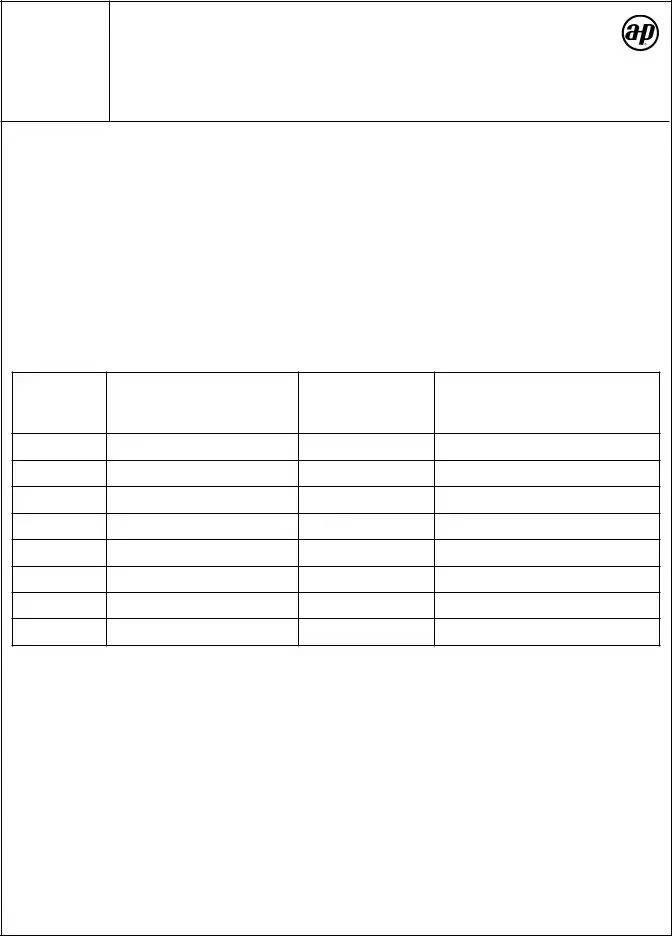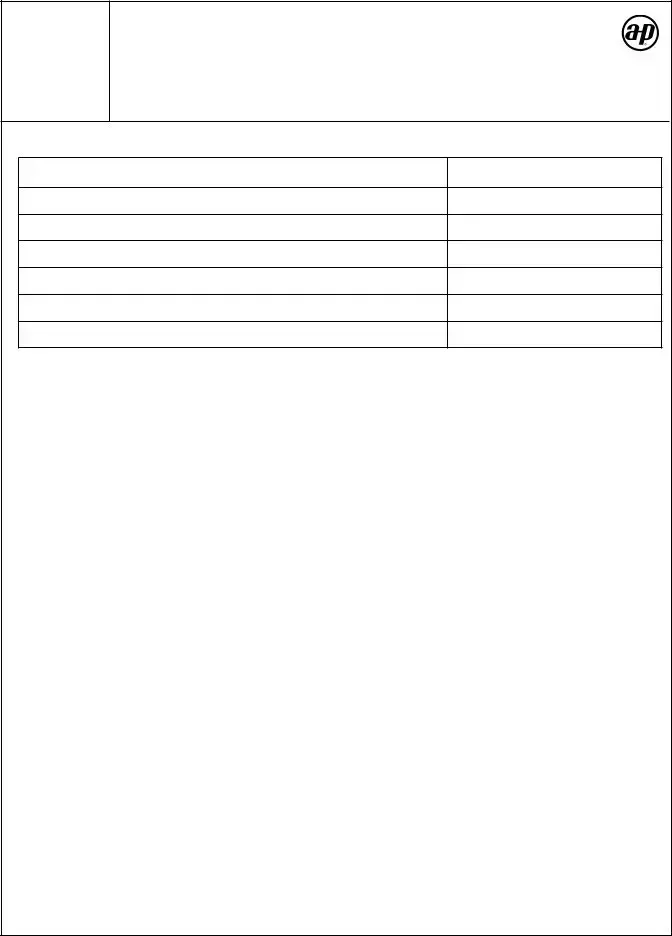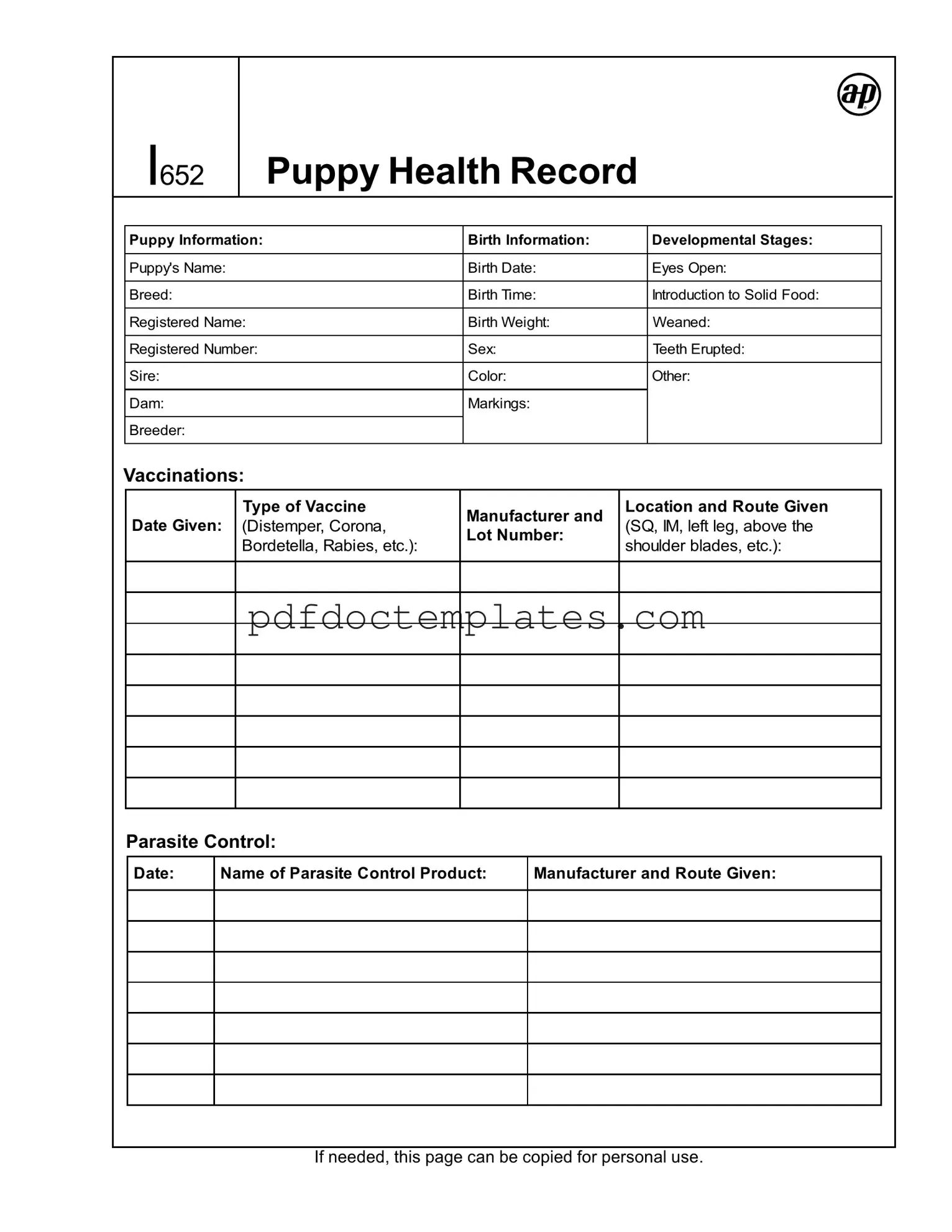Download Puppy Health Record Template
Misconceptions
When it comes to the Puppy Health Record form, several misconceptions can lead to confusion for new pet owners. Understanding these myths can help you better care for your furry friend.
- It's only for registered puppies. Many believe that the Puppy Health Record is only necessary for registered dogs. In reality, all puppies benefit from having a health record, regardless of their registration status.
- Vaccinations are optional. Some owners think vaccinations are not crucial. However, vaccines protect puppies from serious diseases and are essential for their health and well-being.
- Once filled out, the form doesn't need updates. Many assume that a completed health record is static. In fact, it should be updated regularly with new vaccinations, treatments, and health check-ups.
- Only veterinarians can fill out the form. While veterinarians play a key role, owners can also document their puppy's health milestones and treatments, fostering a collaborative approach to pet care.
- All vaccines are given at the same time. Some people think all vaccinations can be administered simultaneously. However, vaccines are typically given at specific intervals to ensure maximum effectiveness.
- Parasite control is not necessary for indoor dogs. Many believe that indoor puppies do not need parasite control. This is a misconception, as indoor pets can still be exposed to parasites.
- Health records are only needed for the first year. Some owners think that health records are only important during a puppy's first year. In truth, maintaining a health record throughout your dog's life is beneficial for ongoing health management.
- Health records are only for emergencies. Many assume that these records are only needed in emergencies. However, they are valuable for routine vet visits and can help track your puppy’s health over time.
- The form is too complicated to use. Some people feel overwhelmed by the form's layout. In reality, it is designed to be user-friendly, making it easy to keep track of your puppy's health milestones.
File Details
| Fact Name | Details |
|---|---|
| Puppy Identification | The form includes essential details about the puppy, such as name, breed, birth date, and registered number. |
| Vaccination Records | It tracks vaccinations administered, including the type of vaccine, date given, and manufacturer details. |
| Developmental Milestones | The form outlines key developmental stages, including weaning, introduction to solid food, and initial vaccinations. |
| Parasite Control | Details on parasite control products used are recorded, including the date of administration and product information. |
| State-Specific Regulations | In some states, specific laws govern the use of puppy health records. For example, California requires vaccination records to be maintained for a minimum of three years. |
Key takeaways
Using the Puppy Health Record form effectively can help ensure your puppy's health and development are well-documented. Here are key takeaways to consider:
- Accurate Information: Fill in all sections with precise details about your puppy, including name, breed, and birth date.
- Vaccination Tracking: Record each vaccination, including the type and date given. This will help maintain a proper vaccination schedule.
- Parasite Control: Document any parasite control products used, including the name and manufacturer. This information is crucial for ongoing health management.
- Developmental Milestones: Keep track of important developmental stages, such as when your puppy's teeth erupt or when they are introduced to solid food.
- Veterinary Visits: Note any examinations or procedures performed by a veterinarian. Include findings and comments to maintain a comprehensive health history.
- Schedule of Events: Follow the suggested schedule for vaccinations, deworming, and other key events. This helps ensure your puppy stays on track for optimal health.
- Personal Use: If needed, make copies of the form for your records. Keeping a personal copy can help you stay organized.
Dos and Don'ts
When filling out the Puppy Health Record form, it’s essential to ensure accuracy and completeness. Here’s a list of things you should and shouldn’t do:
- Do fill in all required fields completely, including the puppy's name, birth date, and breed.
- Do keep a copy of the form for your records, as it can be useful for future veterinary visits.
- Do note down the dates and details of vaccinations and parasite control accurately.
- Do consult with your veterinarian if you have questions about specific vaccinations or procedures.
- Do update the record as your puppy grows and receives more vaccinations or medical care.
- Don’t leave any sections blank; incomplete information can lead to confusion later.
- Don’t use abbreviations or shorthand that may not be understood by others reviewing the form.
- Don’t forget to include the manufacturer and lot number for vaccines, as this is crucial for tracking.
- Don’t rely solely on memory; always record details immediately after vaccinations or treatments.
- Don’t ignore the advice of your veterinarian regarding vaccination schedules and parasite control.
Common mistakes
-
Incomplete Information: Failing to fill in all required fields, such as the puppy's name, birth date, or breed, can lead to confusion later.
-
Incorrect Dates: Entering the wrong dates for vaccinations or other significant events can result in missed treatments or unnecessary repeat procedures.
-
Missing Vaccination Details: Not specifying the type of vaccine or the manufacturer can hinder future veterinary care and tracking.
-
Omitting Owner or Veterinarian Initials: Failing to initial findings or comments can leave important notes unverified and unclear.
-
Ignoring Developmental Stages: Not documenting key developmental milestones, like when the puppy's teeth erupted or when solid food was introduced, can affect care decisions.
-
Inconsistent Terminology: Using different names for the same vaccine or product can create confusion and complicate record-keeping.
-
Neglecting to Track Parasite Control: Forgetting to note the date and type of parasite control used can lead to gaps in treatment and health issues.
-
Not Keeping a Copy: Failing to make a copy of the completed form for personal records can result in lost information when needed for future vet visits.
What You Should Know About This Form
-
What is the purpose of the Puppy Health Record form?
The Puppy Health Record form serves as a comprehensive log of important health information for your puppy. This document tracks vaccinations, developmental milestones, and any medical procedures performed. It helps ensure that your puppy receives appropriate care and vaccinations at the right intervals, which is crucial for their overall health and well-being.
-
What information is included in the Puppy Health Record form?
The form includes various sections that capture essential details about your puppy. Key areas cover:
- Puppy information such as name, breed, and color.
- Birth details, including date and weight.
- Vaccination records, detailing types of vaccines administered and dates given.
- Parasite control measures, including products used and their administration.
- Examinations or procedures performed by a veterinarian or the owner.
- A schedule of developmental events from birth to spay or neuter.
This thorough documentation aids in tracking your puppy’s health journey.
-
How should vaccinations be scheduled according to the form?
The form recommends administering vaccinations ideally at three-week intervals. This schedule helps to build your puppy's immunity gradually and effectively. For example, the first shot is typically given between 6 to 8 weeks of age, followed by additional shots at the specified intervals until they reach 15 to 17 weeks. Following this schedule is vital for protecting your puppy against common diseases.
-
Why is it important to document de-worming and parasite control?
Documenting de-worming and parasite control is essential for several reasons. First, it helps prevent infestations that can harm your puppy’s health. Second, keeping a record ensures that you stay on top of necessary treatments, as different products may be recommended depending on the type of heartworm prevention used. Regular de-worming, typically starting at 2 weeks of age, is crucial for maintaining your puppy's health and should be noted in the health record.
Puppy Health Record Example

I652
PuppyHealthRecord
Puppy Information: |
Birth Information: |
DevelopmentalStages: |
|
|
|
Puppy's Name: |
BirthDate: |
Eyes Open: |
|
|
|
Breed: |
BirthTime: |
Introductionto Solid Food: |
|
|
|
Registered Name: |
BirthWeight: |
Weaned: |
|
|
|
Registered Num er: |
Sex: |
TeethErupted: |
|
|
|
Sire: |
Color: |
Other: |
|
|
|
Dam: |
Markings: |
|
|
|
|
Breeder: |
|
|
|
|
|
Vaccinations:
Date Given:
Type of Vaccine (Distemper,Corona, Bordetella,Ra ies,etc.):
Manufacturer and ot Number:
ocation and Route Given (SQ,IM,leftleg,a ove the shoulder lades,etc.):
ParasiteControl:
Date: |
Name of Parasite ControlProduct: |
Manufacturer and Route Given: |
|
|
|
|
|
|
|
|
|
|
|
|
|
|
|
|
|
|
|
|
|
|
|
|
Ifneeded,thispagecanbecopiedforpersonaluse.

I652
PuppyHealthRecord PAGE 2
ExaminationsorProceduresPerformedbyOwnerorVeterinarian:
Date: |
Findings and Comments: |
|
|
Owner or Veterinarian Initials:
Schedule of Events fromBirthtoSpayor Neuter
*Each vaccination should ideallybegivenatthree weekintervals.
**Thetimetobeginheart- worm medication can vary dependingontheproduct andtimeofyear.
***The
SeepagesA622andA905for parasitecontrolandvaccination suggestions.
Events |
Age |
Date |
|
|
|
Birthdate |
Day1 |
|
|
|
|
Dewclawremovaland taildock |
|
|
|
|
|
2 weeks |
|
|
|
|
|
Toenailtrim |
2 weeks |
|
|
|
|
Solid food introduction |
3 weeks |
|
|
|
|
4 weeks |
|
|
|
|
|
Toenailtrim |
5 weeks |
|
|
|
|
1stcar trip |
6 weeks |
|
|
|
|
1stshot |
|
|
|
|
|
Physicalexamination yvet |
|
|
|
|
|
6 weeks |
|
|
|
|
|
Weaning |
|
|
|
|
|
Move to cages |
7 weeks |
|
|
|
|
8 weeks |
|
|
|
|
|
Toenailtrim |
9 weeks |
|
|
|
|
2nd Shot* |
|
|
|
|
|
3rd Shot |
|
|
|
|
|
Beginheartwormmedication** |
|
|
|
|
|
12 weeks |
|
|
|
|
|
4thand finalshots |
|
|
|
|
|
Spayor neuter |
|
|
|
|
|
Ifneeded,thispagecanbecopiedforpersonaluse.
Consider More Forms
Simple Boyfriend Application Form - A nature enthusiast, often finds comfort in natural surroundings.
In addition to the governance structure and operational guidelines, LLCs in Florida may find it beneficial to utilize resources such as All Florida Forms to ensure they have the most up-to-date and compliant documentation, helping to streamline the formation process and enhance operational clarity.
Baseball Evaluation Sheets - Documenting performance helps track progress over time.
